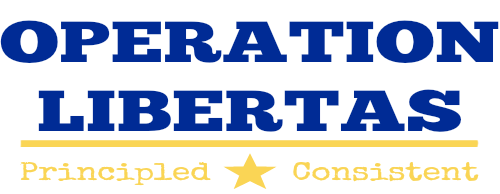The Non-Aggression Principle, A Foundation for Freedom
The Non-Aggression Principle is a foundational principle of libertarian philosophy. As a pillar that most of the philosophy stands on, it was chosen as the topic for our first article for Operation Libertas. The Non-Aggression Principle (NAP for short) states that no one should initiate force or the threat of force to coerce someone to do something. Very few people would disagree with this idea in principle. It is simple, straight forward, and is a necessity of a free society.
The concepts of liberty and freedom have been debated since ancient Greece. Throughout history, society has found many different ways to both exercise and suppress liberty. At the most basic level, we can agree that if you are free then you must own your body and your thoughts. Slavery is the antithesis of freedom. Slaves were not considered to own their own bodies. Their ownership was viewed as belonging to their master. Their masters, or owners, initiated force to capture them and force them to do their bidding. Therefore, ownership of your body is a prerequisite of freedom.
In a free society, we must be free to act and engage with one another without force being initiated against us and without initiating force on someone else. When we take humanity in its natural state, we would find individuals working in nature to survive. Some people might fish or hunt the land for sustenance and others might grow crops and domesticate animals. A group of nomads who come along and take someone’s fish or crops would be initiating force to take what is not theirs. This would not be a free society, because one group is initiating force to take resources from another group. Thankfully, we have largely moved away from a world as stark as described here. Unfortunately, we still have groups of people who feel it is necessary, some would argue ideal, to take from one group and distribute those resources to another. Anyone who believes this is just might have their arguments in favor, however, those arguments will always conflict with the Non-Aggression Principle, and thus conflict with the ideas of freedom and liberty.
In today’s political environment there are people on the right who want to give special favors to corporations and people on the left who want to give special favors to the poor. This is no different from the nomadic raiders of yesteryear galloping in and stealing someone’s fish or crops. Nomadic raiders have been replaced with politicians and interests groups. They pass a bill that taxes all of us and redistributes those funds to their pet projects. Again, there are people who may believe this is a just and even ideal system. But these people would be in direct conflict with the NAP. Force is being used through the law, taxation, and threats of imprisonment to take from some people and redistribute it to others. This system is diametrically opposed to freedom and liberty.
Now that we have taken the NAP further down this logical path, we have assuredly lost people who make excuses for why force is justified under certain circumstances. They have found ways to argue against the NAP without realizing they have lost their way along the path of liberty. Once force is used against you to take what you have earned, you are no longer free. You are no different than the slave who is told by his owner what to do with their time and the wealth they have accumulated through their efforts.
At Operation Libertas, we support voluntary transactions between individuals and understand that is how we create and spread liberty, as well as create more prosperity and opportunities for every individual in a free society.
Recommended Reading:
Don’t Hurt People and Don’t Take Their Stuff: A Libertarian Manifesto
Short, quick read that does a great job of explaining the basics of libertarian ideas. I’m a slow reader and I finished this book in a couple days. You could probably finish it in one sitting.
The Libertarian Mind: A Manifesto for Freedom
The Libertarian Mind, by David Boaz was the first book I read to figure out what this whole libertarian idea was all about. I really liked the historical context provided in this book, from English aristocracy demanding more freedom from the King, to the US Constitution, and into the present. Boaz break down a lot of different topics and really opened my mind to what freedom really meant.


